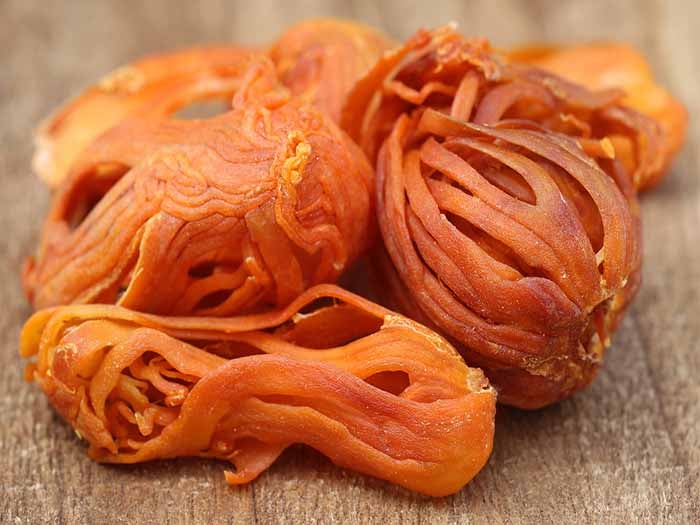The health benefits of spices are innumerable. They aid in weight loss, controlling diabetes, improving brain function, reducing nausea, and boosting immunity. They also help in improving heart health, inducing sweating, keeping the skin healthy, regulating the metabolism, and detoxifying the body. Spices protect the body by fighting infection, reducing inflammation, and preventing cancer. [1]
They are also good for increasing appetite, strengthening bones, reducing stress, improving digestion, protecting against diseases, curing colds, protecting oral health, and balancing the hormones.
Health Benefits of Spices
According to a study published in the Critical Reviews in Food Science and Nutrition journal, various spices that are used to add flavor to recipes also provide many health benefits. Furthermore, a collaboration of various studies was presented at the May 2014 McCormick Science Institute Science Summit, which was organized in partnership with the American Society for Nutrition. It highlighted how spices and herbs help improve public health through flavorful eating. [2] [3]
Let’s take a look at the exciting benefits that many of the world’s most popular spices can contribute to our overall health! These include cinnamon, turmeric, ginger, sage, peppermint, mint, turmeric, and basil among others.
Allspice
Allspice is a soothing, anti-inflammatory, and carminative spice. Its benefits include reducing cancer, improving oral health, stimulating digestion, facilitating bone growth, and boosting the immune system. It also helps in reducing blood pressure and acts as an analgesic substance.

Spices help to add a number of flavors to your food. Photo Credit: Shutterstock
Anise Seed
This powerful spice has an antioxidant as well as a stomachic, anti-spasmodic, carminative, antiseptic, digestive, expectorant, and stimulant properties. It is a great source of vitamins and minerals like iron, potassium, copper, and manganese. These seeds help increase the circulation and oxygenation of body parts while boosting the immune system and improving the quality of your skin. [4]
Arrowroot
Arrowroot helps in growth and development, reducing blood pressure, increasing circulation, and improving the health of the digestive system.
Bay Leaf
Bay leaf is a very popular spice throughout the world and is praised for its ability to prevent cancer, boost immunity, reduce neural tube defects, protect oral health, skin care, and hair care. It also helps improve nervous system function, regulate body metabolism, and prevent blood-related conditions like anemia.
Black Pepper
Black pepper is one of the most common spices in the world packed with many health benefits. It has an ability to reduce inflammation and excess gas, optimize gastrointestinal action, and regulate enzymatic reactions. Black pepper helps control heart rate and blood pressure and prevent cancer due to its antioxidant properties.
Cayenne Pepper
Cayenne pepper has the ability to clear the sinuses, increase urination, eliminate toxins from the body, help manage diabetes, prevent cancer, and lower blood pressure. Use of cayenne pepper helps speed up weight loss, optimize the metabolism, regulate hormonal activity, and fight toxins and potential infections, due to its powerful antioxidant properties.
Capers
Capers prevent cancer, reduce illness, boost immunity, strengthen blood vessels, reduce clotting, lower cholesterol levels, and increase circulation. They also provide a huge wealth of vitamins like vitamin A, vitamin K, niacin, riboflavin, and minerals like iron and copper.
Caraway Seeds
Caraway seeds can improve digestion, reduce constipation, lower blood cholesterol levels, reduce excess gas, neutralize free radicals, and prevent various diseases like cancer. They also regulate blood pressure and eliminate atherosclerosis. These seeds provide vitamins like thiamin, pyridoxine, riboflavin, and niacin. Not only that, they also provide minerals like iron, copper, calcium, potassium, manganese, selenium, zinc, and magnesium.
Cardamom
The health benefits of cardamom include its ability to aid digestion, reduce spasms, lower blood pressure, increase the metabolism, improve circulation, and increase frequency and volume of urination. It also provides the essential vitamins like riboflavin, niacin, vitamin C, and minerals like iron, manganese, and potassium. [5]

Sprinkle cinnamon powder on your coffee for a boost! Photo Credit: Shutterstock
Cinnamon
Cinnamon is praised for its ability to reduce inflammation, eliminate pain, manage diabetes, eliminate infections, reduce excess gas, and improve heart health. It also helps in increasing cognitive function, building strong bones, preventing cancer, and improving the health of the eyes and skin! The National Institutes of Health has provided a detailed information about the benefits of this spice and its safety. [6]
Cloves
Cloves have antimicrobial properties, which help in fighting oral diseases. They also are good for boosting the immune system, preventing cancer, and preserving bone health.
Cumin
Cumin seeds are antioxidant, anti-inflammatory, and carminative by nature. They improve digestion, increase sperm count, build strong bones, improve eyesight, and prevent macular degeneration. Other benefits of cumin seeds include their ability to manage heart rate, lower blood pressure, act as a co-factor in many enzymatic reactions, increase red blood cell count, and prevent various types of cancer.
Fennel Seeds
According to Michigan Medicine, fennel has raditionally been used to cure upset stomach, prevent gas, and treat colic and cough in infants.Fennel has also been known for its ability to regulate bowel movements, prevent cancer, delay aging through antioxidant activity, and increase enzymatic activity. Fennel seeds act as a great source of many minerals, including copper, iron, calcium, potassium, manganese, selenium, zinc, and magnesium. They are also rich in organic compounds and acids like pinene, myrcene, fenchone, chavicol, cineole, anethole, limonene, and anisic aldehyde. [7]
Fenugreek Seeds
Fenugreek seeds are a very popular and effective spice in certain Asian cultures that add a powerful nutrient boost to the body. They have the ability to improve digestion and reduce constipation, lower cholesterol levels, regulate insulin levels, and manage fluid levels in the body.
Garlic
Garlic is a great spice used to add a unique flavor to the food. It helps fight heart disorders, high blood pressure, and cold and cough, says a study published in the Avicenna Journal of Phytomedicine. [8]
Ginger
Largely known for aiding in digestion, ginger is a spice that exerts many benefits like preventing cancer, boosting the appetite, and improving respiratory conditions, among others.
Horseradish
Horseradish has the ability to increase urination, reduce inflammation, and soothe the nerves. It also helps in preventing cancer, stimulating healthy digestion, and boosting the immune system due to its antioxidant compounds. According to the Michigan Medicine, horseradish has been traditionally used as a digestive stimulant and to treat worms, coughs, and sore throats. [9]

Mace helps to flavor your baked goods, meat, and pickles. Photo Credit: Shutterstock
Mace
Mace has the ability to boost the immune system, build strong bones, reduce depression, increase sexual libido, stimulate digestion, and reduce excess gas and insomnia. It also helps keep the skin healthy, boost hair health, and increase circulation to all parts of the body.
Mustard Seeds
Mustard seeds are packed with organic compounds and volatile oils that can boost your overall health. They are also a wonderful source of B-complex vitamins, which are essential for the normal functioning of your organs.
Nutmeg
Nutmeg is a great source of antioxidants, vitamins, and minerals necessary for human health. It can fight fungal infections, work as an aphrodisiac, improve digestion, reduce excess gas, improve hair and skin health. It also helps prevent macular degeneration, and reduce the chances of developing cancer.
Saffron
Saffron contains many carotenoids and boosts immune system health in a big way. It also fights infections in wounds, elevates mood, induces sleep, stimulates red blood cell formation, eliminates spasms, and modulates hormonal activity. Saffron can reduce blood pressure through the vasodilating properties of potassium found in it.
Turmeric
Turmeric rich in curcumin is best known for its anti-inflammatory properties. It aids in skin care, prevents cancer, eases menstruation, and detoxifies the body, according to a study conducted by Dr. Susan Hewlings, Department of Nutrition, Central Michigan University, US. [10]
Tamarind
Tamarind is a South Asian spice is very popular because it has the ability to improve blood vessels and artery strength, regulate digestion and excretion in a healthy way, prevent cancer, lower blood cholesterol, and build strong bones. It also helps increase blood circulation and oxygenation, regulate enzymatic activity in the body and improve the mucous membranes throughout the body as well.

The vanilla bean isn’t just delicious and a flavor to enjoy in ice cream and desserts but also a nutritional powerhouse. Photo Credit: Shutterstock
Vanilla Beans
Vanilla contains a wide array of chemical compounds and volatile oils, all of which have their own health benefits. However, the studies done on vanilla beans have shown that they help control blood pressure, reduce heart rate, soothe nerves, regulate the body metabolism, induce sleep, and build strong bones.
What are Spices?
Spices are the dried form of various seeds, roots, fruits, barks, vegetables, and other plant substances primarily used for coloring, flavoring, and preserving the food.
- They are found everywhere in the world and form an essential part of the culinary practices of all the cultures. Their original use was as a flavoring agent, which then demonstrated antimicrobial properties by keeping the food fresh for longer durations and improving the health of those who ate them regularly. A study conducted by Dr. John Hayes, Department of Food Science, The Pennsylvania State University, US, adding herbs & spices to food increased the high school students’ liking for several vegetables. [11]
- One of the best things about spices is that when prepared, dried, and stored properly, they can last almost forever.
- Also, since they are so low in calories, being ground up in tiny forms, there is no danger of any side effects. In fact, they contain proteins and organic compounds that are necessary for overall health. [12]
Flavor Profile of Spices
Bitter
- Bitter spices are believed to have an acquired taste.
- Spices that are considered bitter are bay leaves, fenugreek seeds, horseradish, mace, cloves, cumin seeds, etc.
Earthy
- These spices have an earthy flavor, which comes from geosmin.
- Cumin and saffron are spices that have an earthy flavor.
Hot
- Hot spices are those that add a strong flavor to the food and make it spicier.
- Pepper, chilis, mustard seeds, garlic are all hot spices.
Sweet
- These spices are slightly sweet in taste and can be used with sour and bitter flavors.
- Allspice, caraway, fennel, cardamom, nutmeg, poppy seeds, sesame seeds, star anise seeds are all considered as sweet spices.
Spices by Cuisine
Let us look at some of the spices used in popular cuisines across the world. [13]
Indian Spices
Indian spices apart from being famous for culinary aspects have long been used to treat various health issues that include improving heart health (Source: Indian Spices for Healthy Heart – An Overview, published in Current Cardiology Reviews) The following spices are included in a variety of Indian dishes: [14]
Cardamom, black pepper, curry leaves, fenugreek, ginger, fennel, ajwain, tamarind, bay leaves, cayenne pepper, cumin, coriander seed, turmeric, clove, ginger, nutmeg, paprika, garam masala, curry powder, and cinnamon.
Middle Eastern Spices
Middle Eastern cuisines include the following spices:
Cumin, nutmeg, cardamom, turmeric, sumac, Baharat, caraway, anise seeds, allspice, cinnamon.
Mediterranean Spices
Majority of Mediterranean dishes include these common spices:
Cinnamon, oregano, bay leaves, cardamom, cinnamon, allspice, pepper, nutmeg.
Other Spices
Sichuan pepper, ginseng, and chipotle are other spices that are used in many cuisines.
Start spicing up!
